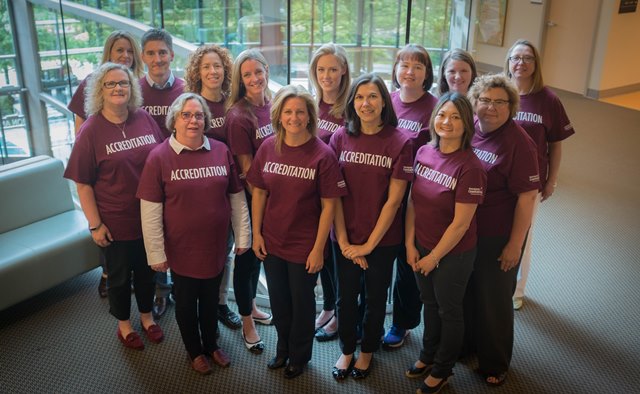How Vancouver Coastal Health aced its first region-wide accreditation
By Serena Bertoli-Haley
Vancouver Coastal Health (VCH) is a regionally integrated, full-continuum health authority providing services to over 1 million British Columbians in a diverse geographical area including urban, rural and remote communities.
In the beginning
VCH has a long history of success using Accreditation Canada programs such as Qmentum to help improve care. In February 2016, VCH and partner organizations Provincial Health Services Authority and Providence Health Care, became Canada’s first recipients of Accreditation Canada’s Trauma Distinction for their regionally integrated trauma system. But since VCH was formed in 2001, accreditation had been a phased process, with accreditation surveys taking place in different years for Vancouver, Richmond, and the Coastal area of North Vancouver, Sea to Sky, Sunshine Coast/Powell River and Central Coast. One result of this was that some part of the organization was always in “accreditation preparation mode”. More importantly, this sequential approach to accreditation, with different versions of the standards being used in different geographical areas, was at least a partial barrier to organization-wide consistency of practices.
Enter the Big Bang
2016 brought a new experience to Vancouver Coastal Health as it hosted its first health authority-wide Accreditation Canada site visit—the largest and most comprehensive to date. All sites would be surveyed the same week: September 18-23, 2016. It was a massive undertaking.
The transition to a single accreditation visit was part of a broader strategy aimed at reducing variations in care and unifying processes and clinical systems across the region (see www.cstproject.ca). We needed the accreditation process to help us embed the same service excellence standards into day-to-day practice across our diverse settings. Thinking regionally and acting locally in a way that made sense and could be sustained by our geographically diverse services and facilities would be the key to our success.
We have lift-off
The Regional Quality & Patient Safety team organized the accreditation readiness strategy and activities around these phases and priorities:
- Self-assess and validate: as soon as the standards became available, we sought to understand strengths and areas for improvement based on current practices. Self-assessment results were validated with clinical teams across VCH to identify which areas for improvement were common issues that should be addressed regionally, and which could be championed locally
- Set priorities: based on the information uncovered above, we selected a core set of “vital few” VCH-wide priorities for improvement targeting the areas expected to make the largest overall impact on patient safety and accreditation for the largest number of teams. We identified 6 top-priority Required Organizational Practices (ROPs) to become regionally coordinated working groups
- Phase 1 – ROP Working Groups: we brought together regional content experts, as well as local process experts, formal and informal leaders, and champions of quality improvement across VCH to develop guidelines, processes, workflows and practical tools, oversee implementation, and monitor progress
- Phase 2 – Program-level support: Accreditation Coordinators worked with local teams in each geographical Community of Care to support engagement and education, Plan-Do-Study-Act cycles, measurement for improvement, and overall sustainment of the standards into local practice.
- Phase 3 – Tracers: teams across VCH practiced the “tracer” methodology used by accreditation surveyors to gauge readiness and know what to expect during the site visit; this also became an opportunity to train clinical and operational leadership in how to use tracers as an ongoing quality improvement tool
- Logistics: Together with Accreditation Canada, we identified which programs and teams would represent VCH as an integrated region in the site visit, organized activities, discussion groups and evidence, and made logistical arrangements with each team hosting a tracer to ensure a smooth site visit experience
Stellar results
Vancouver Coastal Health’s first heath authority-wide site visit was a great achievement on its journey to regional integration. VCH received a decision of “Accredited”, meeting 94 per cent of over 4000 criteria assessed across 28 sets of standards and over 60 urban, rural and remote locations visited by our team of 22 surveyors. Our approach to accreditation, combining regional oversight with local implementation support, was a key success factor in demonstrating consistent practice across VCH. This, in turn, minimized the number of “work in progress” areas requiring formal follow-up after the site visit. More importantly, it strengthened relationships and networks to support quality improvement across geographical and operational boundaries making VCH a more connected, patient-and-family-centred, and evidence-driven organization.
For more information about Vancouver Coastal Health visit VCH.ca. Questions about the accreditation process described in this article can be directed to serena.bertoli-haley@vch.ca.


